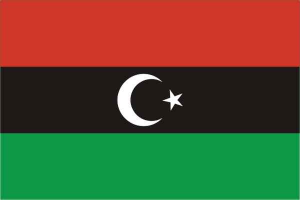Language/Libyan-arabic/Grammar/Adjectives
Hi Libyan Arabic learners! 😊
In this lesson, we will be discussing adjectives in Libyan Arabic. Adjectives as you know are words that describe or modify nouns or pronouns in a sentence. The placement of adjectives in sentences is a key aspect of Libyan Arabic Grammar. Understanding the rules of adjectives will expand your vocabulary, and allow you to communicate more effectively.
With the completion of this lesson, consider investigating these related pages: Questions, Plurals, Negation & How to Use Have.
Adjectives in Libyan Arabic[edit | edit source]
In Libyan Arabic, adjectives generally follow the noun, similar to other Arabic dialects. However, sometimes you may hear adjectives occur prior to the noun, creating a more poetic effect.
Here are some examples of adjectives in Libyan Arabic:
| Libyan Arabic | Pronunciation | English |
|---|---|---|
| بيت كبير | beyt kbir | big house |
| سيارة حمرا | sayyara ḥmara | red car |
| شعر أسود | shaʕr aswad | black hair |
| ملابس حلويين | mlabis 7elwiyyin | pretty clothes |
| مطعم جيد | maʔtam jayyid | good restaurant |
As you can see, adjectives agree in gender and number with the noun it describes. The adjective changes its ending to match the gender and the number of the noun it describes.
Here are some examples of adjectives agreeing in gender and number in Libyan Arabic:
Pronoun: masculine singular
| Libyan Arabic | Pronunciation | English |
|---|---|---|
| سيارة حمرا | sayyara ḥmara | red car (masculine singular) |
Pronoun: feminine singular
| Libyan Arabic | Pronunciation | English |
|---|---|---|
| بيت كبيرة | beyt kbira | big house (feminine singular) |
Pronoun: masculine plural
| Libyan Arabic | Pronunciation | English |
|---|---|---|
| مطاعم جيدة | maʔtaam jayyida | good restaurants (masculine plural) |
Pronoun: feminine plural
| Libyan Arabic | Pronunciation | English |
|---|---|---|
| ملابس حلوة | mlabis 7eluwa | pretty clothes (feminine plural) |
Keeping track of the gender and number of nouns can be confusing, but with practice, it will become easier.
Comparison of Adjectives[edit | edit source]
Comparative adjectives are used to compare differences between the two objects in question. Libyan Arabic uses the word "أحسن" (aḥsen) to make comparisons. The word "أحسن" is usually placed before the adjective in question.
Here are some comparative adjectives in Libyan Arabic:
| Libyan Arabic | Pronunciation | English |
|---|---|---|
| خضار طازحين أحسن من الخضار الذي بالسوق | khaḍaar taazhihyan aḥsan min el-khaḍaar elli fel-sooq | Fresh vegetables are better than vegetables in the market. |
| المذاق الذي في الطعام هذا أحسن من ذاك | el-maḏaaq elli fel-ta3aam haḏa ahsan min ḏak | The taste of this food is better than that. |
Superlative adjectives are used to describe the highest degree of something. In Libyan Arabic, the word "أحسن" (aḥsan) can be used to indicate the superlative form. "The most" can be expressed by using "أحسن" (aḥsan) with "كتير" (ktiir), meaning "a lot" in English.
Here are some superlative adjectives in Libyan Arabic:
| Libyan Arabic | Pronunciation | English |
|---|---|---|
| هذا هو أحلى لحم أكلته كتير | haḏa huwa aḥla laḥm aktaltuuh ktiir | This is the best meat I ever ate. |
| هذا هو أحلى يوم في حياتي كتير | haḏa huwa aḥla yawm fi 7ayatii ktiir | This is the best day of my life |
Practice Dialogue[edit | edit source]
To better understand how to use adjectives in Libyan Arabic, let's look at a dialogue between two friends.
- Person 1: شو رأيك بالمطعم الجديد؟ (shu raʔyak bil-maʔtam el-jideed?) (What do you think of the new restaurant?)
- Person 2: المطعم جميل جدا والأكل كان لذيذ (el-maʔtam gameel jiddan wel-akel kaan laḏiiz) (The restaurant is very beautiful and the food was delicious.)
- Person 1: هل كنتم تجلسون في الطابق الأول أم الثاني؟ (hal kuntum tajlisoun fil-taabiq el-awwal am eth-thaani?) (Did you sit on the first floor or the second?)
- Person 2: جلسنا في الطابق الثاني لأن الإطلالة أحلى من الطابق الأول (jalasna fil-taabiq el-thaani liʔann el-iiṭlaala aḥla min el-taabiq el-awwal) (We sat on the second floor because the view is better than the first floor.)
Conclusion[edit | edit source]
Adjectives are an important part of Libyan Arabic grammar. Remember to keep track of the noun's gender and number when using adjectives. Make comparisons and use superlatives when appropriate. To improve your Libyan Arabic Grammar, you can also use the Polyglot Club website. Find native speakers and ask them any questions!
➡ If you have any questions, please ask them in the comments section below.
➡ Feel free to edit this wiki page if you think it can be improved. 😎
With this lesson finished, you may want to explore these additional pages: Pronouns, Say Hello and Greetings in Libyan Arabic, How to Use Be & Conditional Mood.

